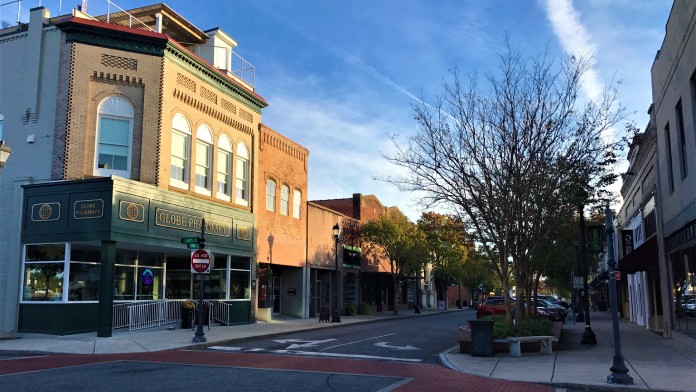Substance Abuse Statistics in Greenville, NC
Adults aged 25-34 were the most likely to visit an ED for drug overdose in the first half of 2022.2
From 2016 to 2019, the drug overdose death rate per 100,000 population was highest among African Americans (17.7), followed by Hispanics (9.06).3
In 2020, 62 people died of an overdose in Pitt County.4
Levels of Care for Addiction Treatment Settings
There are various types and settings of drug rehab, varying in structure and intensiveness.
Professional Detox
If you are dependent on alcohol or drugs like opioids, quitting can lead to uncomfortable withdrawal symptoms. Inpatient and outpatient detox can help manage your withdrawal symptoms and reduce the risk of relapsing to substance use.
Inpatient Care
Residential rehab is the most structured and intensive setting, providing a peace and serene environment to jumpstart your recovery, away from everyday stressors. You live at the treatment center during treatment and receive a variety of therapies and interventions.
Partial Hospitalization Programs (PHPs)
A step down from inpatient rehab, you attend several hours of treatment per day and return home during non-treatment hours (typically the evening or nighttime). This is a great option for someone who needs a high level of care but doesn’t want to stay overnight at a residential facility.
Intensive Outpatient Programs (IOPs)
Less intensive than PHP, an IOP involves several hours of therapy per week, often visiting the treatment center between three and five days each week. This is often used as a step-down option from inpatient or PHP, though some people’s first point of contact with substance abuse treatment may be an IOP, especially if their addiction is mild or they want to continue working or attending school while recovering.
Standard Outpatient
The least intensive treatment option, standard outpatient, involves one to two hours of treatment per day for one or two days per week. This option has the least oversight and supervision, which increases the risk of relapse; however, highly motivated people with a strong support system may find this level beneficial.
Aftercare
Support doesn’t end once you complete your drug rehab program—it’s important to receive aftercare, which can provide you with ongoing support and encouragement in the form of 12-step groups, non-12-step groups like SMART Recovery, ongoing therapy, sober living homes, and more.
Financing Drug and Alcohol Rehab in North Carolina
If you are worried that you won’t be able to afford drug and alcohol rehab, check out these strategies for financing addiction treatment.
Private Insurance
If you have private health insurance through work or purchased from the Healthcare Marketplace, you can use it to cover the cost of drug and alcohol rehab, either partially or fully, depending on the treatment program you choose.
North Carolina Medicaid
North Carolina Medicaid is a government program providing health insurance coverage for low-income families and individuals. If you have Medicaid, you can use it to cover substance abuse treatment services, although you’ll want to make sure to find a rehab that accepts this form of payment.
Medicare
If you have North Carolina Medicare, you can use it to pay for the cost of drug and alcohol treatment services; however, you’ll want to make sure to find a facility that accepts Medicare.
TRICARE in North Carolina
North Carolina is in the East Region for TRICARE and provides coverage for drug and alcohol addiction treatment and rehab for military personnel, retirees, and their families.
Sliding Scale Rehabs
If you need financial assistance, you can seek out a sliding scale rehab, which charges a reduced price based on your income.
IHS-Funded Drug Rehabs
The Indian Health Service funds various alcohol and drug treatment centers that provide free care to Indigenous people with substance use disorders.

Traveling to and Within Greenville, NC
If you’ll be traveling for treatment in Greenville, or visiting a loved one currently undergoing treatment at a Greenville drug and alcohol rehab, here are some valuable tips to guide your travel plans:
- The closest airport is Pitt-Greenville Airport in town; however, Coastal Carolina Regional Airport in New Bern, NC (55 miles away) may offer more flight options. Both offer domestic flights only. The closest international airport is in Raleigh (99 miles away).
- North Carolina’s hurricane season lasts from August through October. Greenville has been impacted by 28 tropical storms or hurricanes in the last 30 years.
- Greenville Area Transit (GREAT) offers public bus transportation throughout the city M-F 7:25 am-5:15 pm. Fares are $1.00 one-way. Punch passes are also available at discounted rates.
- Greenville is considered very walkable and very bikeable. Uber and Lyft services are also available to get around the city by car.
- More than a dozen hotel chains are available in Greenville, located mainly along the Highway 264 and Highway 903 corridors.
- Locals consider the southeast area of the city to be the safest part of Greenville.
- For history buffs, Greenville offers more than 30 buildings on the National Register of Historic Places, six sites on the Civil War Trails of America, and several history museums.
- For outdoor adventures in Greenville, there’s camping and kayaking on the Tar River, or biking the Greenville Greenway and Bicycle Post Mountain Bike Trails.
- Popular getaways from Greenville include Asheville, Stumphouse Tunnel Park, and Devil’s Fork State Park.
North Carolina Drug and Alcohol Laws
Below are some important North Carolina laws related to substance misuse:1
North Carolina Recovery Courts: Non-violent offenders can go to court-ordered drug rehab instead of serving jail time.
North Carolina Good Samaritan Overdose Law: Witnesses to overdoses can receive immunity from prosecution when they call 911 to save a person’s life.
Resources
- Pitt, North Carolina. (n.d.). County Health Rankings & Roadmaps. Retrieved December 2, 2022, from https://www.countyhealthrankings.org/explore-health-rankings/north-carolina/pitt?year=2019
- Pitt County. (2022). NC Department of Health and Human Services. https://injuryfreenc.dph.ncdhhs.gov/DataSurveillance/StatewideOverdoseSurveillanceReports/CountyMedDrug/PittCountyMedDrugOverdosewithDependencyPotentialEDVisits.pdf
- Pitt County. (n.d.). Healthy Communities NC. Retrieved December 2, 2022, from https://healthycommunitiesnc.org/profile/geo/pitt-county
- Writer, G. L. S. (2022, July 26). Pitt County turns to providers to determine best use of opioid settlement dollars. Reflector. https://www.reflector.com/sports/local/pitt-county-turns-to-providers-to-determine-best-use-of-opioid-settlement-dollars/article_72f60ac7-5528-5edb-af58-e11f5a8ff024.html
- Medication and Drug Overdose in Pitt County. (2020). NCDHHS, Division of Public Health. https://injuryfreenc.dph.ncdhhs.gov/DataSurveillance/StatewideOverdoseSurveillanceReports/CountyOverdoseDeathSlides/pittcountyoverdosedeathslides.pdf



